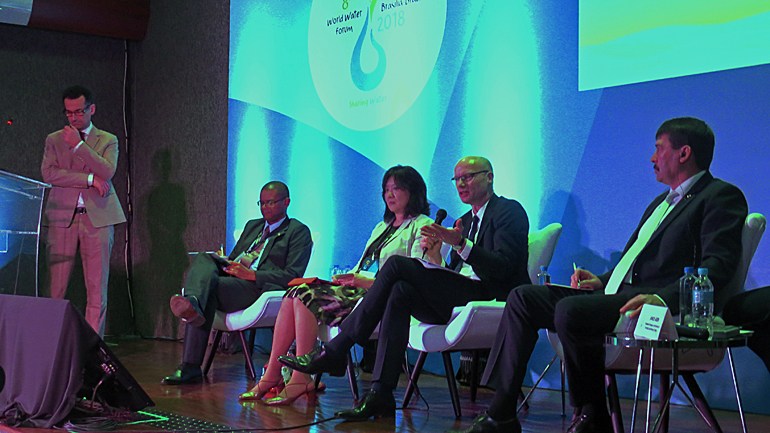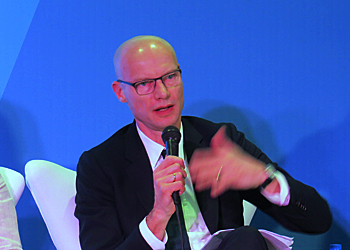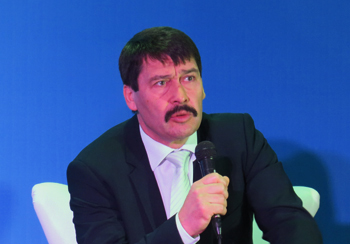World Water Forum 8: A call on the world to fully value water, not just prizing

There is a lot of finance running around in the world, also for investing in water infrastructure. But it is seen as financial costs’, remarked special Dutch water envoy Henk Ovink at the roundtable on financing water.
Ovink made the remark at the roundtable session on financing water on the second day of the World water Forum 8 in Brasilia.
It addressed the recommendations by the High Level Panel on Water (HLPW) to scale up water investment and it discussed the outcomes of two previous roundtables in Paris and Tel Aviv.
According to Henk Ovink the water world lacks the means to fully capture the value of investments in water infrastructure. ‘It are other sectors, like agriculture, the energy sector and health sector that benefit from the investments in the water infrastructure. The value of those benefits are not captured yet in the return on investment’, Ovink said.
President Janos Ader of Hungary, who also participated in the roundtable session, called upon financial institutes to include in their calculations not only the direct damage of extreme weather events but also the indirect losses such as lack of power supply, loss of business and even house owners that cannot pay their mortgages anymore.
 Ovink explained why a step change is needed to be able to increase the investments in water infrastructure worldwide. He called it a comprehensive approach on valuing water.
Ovink explained why a step change is needed to be able to increase the investments in water infrastructure worldwide. He called it a comprehensive approach on valuing water.
Just pricing is not enough
The roundtable session at the World Water Forum was organised by the OECD, World Water Council, the Netherlands and Hungary as a follow up on the previous World Water Forum in Korea in 2015 where these parties concluded that the investments in water infrastructure needed to be scaled up.
Following the previous World Water Forum, a High Level Panel on Water was established by the United Nations and the World Bank. In its final report that was presented on 14 March the HLPW advised to double the investments in water infrastructure. The final report also included five principles to value better water to ensure financing flows to those investments that deliver the greatest benefits for society, the economy and the environment.
During the roundtables it was concluded that this will require a step change in current financing approaches and engagement with a broader range of financers. Just pricing the water supply is not enough.
Water as a leverage
At the roundtable in Brasilia, Henk Ovink explained that to capture the benefits of investments in other sectors it is necessary to look at water in its capacity as leverage to improve the situation in other sectors.
‘If we manage water right the benefits are outside the water world. So, we can manage it right and there is energy and food, and we have peace and stability for economic growth. However, if we manage it wrong, we may have migration, insecurity or lack of food and energy’,
Business cases with other sectors
Ovink advocated a comprehensive approach of valuing water by setting up business cases with other sectors. ‘Infrastructure investments are capital intensive and have a long-term return. So, for new business cases we must build up trust with these partners. It must stick. It has to be sustainable in the process.’
 President Janos Ader of Hungary called upon bankers to include indirect disaster losses in their calculations
President Janos Ader of Hungary called upon bankers to include indirect disaster losses in their calculations
Human rights
At the roundtable president Janos Ader of Hungary touched upon the subject of the right to water. As a higher price for water, can block the access for the poor. ‘Yes, access to water is a human right. But we cannot consider it to be a human right to consume endless quantities of water. Nor can the wasting of water or the pollution of water be considered any kind of human right’, said the Hungarian president.
Ader challenged the global water community scale up the investments in water infrastructure as a part of all the investments that are needed to reach all 17 Sustainable Development Goals by 2030.
‘If we fail on SDG#6, it will be hopeless to achieve the other SDG goals. All investments on more food production, poverty reduction, health improvement of health, and energy supply will be futile’, he predicted.
Continue with subsidy schemes
Senior director Guangzhe Chen of the Global water facility of the World Bank, also participated in the roundtable. Chen advocated to continue with subsidy schemes to be able to deliver water to the poor communities at lower tariffs.
‘It is difficult to prize water. It is more than just the recovery of the costs. For us as World Bank these subsidy schemes are inevitable, but they need to be transparent’, Chen said.
Stay tuned as news items on this website will keep you posted on Dutch contributions to the World Water Forum 8.
Read also on this website
● World Water Forum 8: A look back on a Forum under pressure to achieve SDG6 by 2030, 29 March 2018
● World Water Forum 8: Huge potential for nature based solutions to reduce water risks, 28 March 2018
● World Water Forum 8: Revitalised IWRM-concept can boost action on SDG6 for water, 27 March 2018
● World Water Forum 8: Thirsty cities need to double investments in water infrastructure, 20 March 2018
● Dutch Prime Minister praises progress by UN panel on valuing water, 25 September 2017
● HLPW seeks reactions on principles for broad valuing of water, 11 August 2017|
● Special page on Dutch participation at World Water Forum 8
More information
World water Forum 8
www.worldwaterforum8.org
High Level Panel on Water
www.sustainabledevelopment.un.org/HLPWater
Dutch government
The Hague, the Netherlands
+31 70 3564100
www.government.nl



